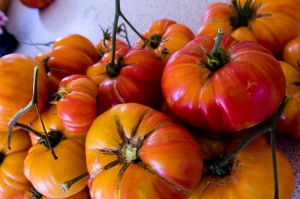A local food story – an apparent success story – is Mad River Food Hub. The Co.Exist article is a nice long read, but for those like me who want to get to the nub, here are the highlights.
After a long intro about unprofitable and failing farmers’ markets, we get to local food hubs, and the hope that a system of local “food hubs” can make local food work by processing and bundling foods and delivering them to us. Wonderful idea – but like farmers markets, most food hubs are not thriving.
The only way farmers are going to make more money is by getting more value out of their products.
It comes down to this:
How do you “value-add”? “Through processing. Through delaying the availability of a product until you can get a higher price–storage. By getting your product to places that you haven’t had it in the past–distribution. And by running your business better–incubation.”
That’s Robin Morris, the brains behind the Mad River Food Hub. But even with these value-adds, Morris couldn’t make the numbers work for a profitable – economically sustainable – food hub, until he did the numbers for meat. Meat is a year-round business, with potential for significant value-add from processing and curing, products selling for up to $24/lb for dry-cured prosciutto.
Now, meat raises ethical issues, especially if you’re vegetarian. Personally, since I know people will continue to eat meat, I’m happy to see any move away from massive factory farms which cause enormous suffering. There’s no guarantee that local artisans will treat animals less cruelly, but at least there’s a likelihood of free range and organic products, which can be a significant improvement.
Back to the article – a key takeaway is that Morris approached his hub with a tough business sense, to make the hub and its food food producers profitable. The hub invested heavily in facilities so that its food-producing entrepreneurs didn’t have to – the hub is an incubator, allowing local food entrepreneurs access to the (expensive) infrastructure for launching their business, in exchange for a cut of the sales.
Finding a niche for the hub has also been key – the hub doesn’t compete at cut-throat price points to sell to institutional clients such as cafeterias. Of course – a small or mid-sized operation could never compete on price, and could only profitably supply an unusually understanding institution that committed to supporting ethical food.
In making this work, Robin Morris’s business sense and careful thinking about numbers and scale are crucial:
Cutting out the middleman to get more of the customer’s money into the hands of the farmer may sound great in a TED talk, but the reality is that there is no way to challenge the economies of scale of industrial food production, which is propped up by subsidies, kickbacks, and money-saving environmental shortcuts…
As a result, businesses are growing that otherwise would have no hope, and Mad River Food Hub operates without grants. The hub produces salamis, soups and “Rookie’s Root Beer” among products, and also packs and distributes farm produce. This approach makes local food possible.
Says a soup maker, the first anchor client of the hub:
Just to fit out a place like this and meet USDA regulations? Let’s say $250,000… Easily. This allowed me to skip that gray area where I’d take on a lot of debt to ramp up and expand, and basically gamble that I could meet all the monthly payments.
This soup maker is also a CSA farmer, using the hub to pack and distribute produce. He sees the power of the infrastructure to make CSA usable and attractive:
The share shows up at work, it’s boxed, it’s got their name on it, and they walk out the door with it. The potential is really big… if I can drop it off on their doorstep, they sign right up.
This takes local food beyond the eco-nuts, those of us who go out of our way and pay extra to support it. With its efficiencies and its distribution system, it might just make for local food that is actually sustainable – because driving miles out of your way to pick up your organic veggies certainly isn’t.
See How To Build A Local Food System, To Make Local Food Actually Work | Co.Exist.
More reading on local food: Locally Delicious – buy from Amazon or read on Appropedia.


